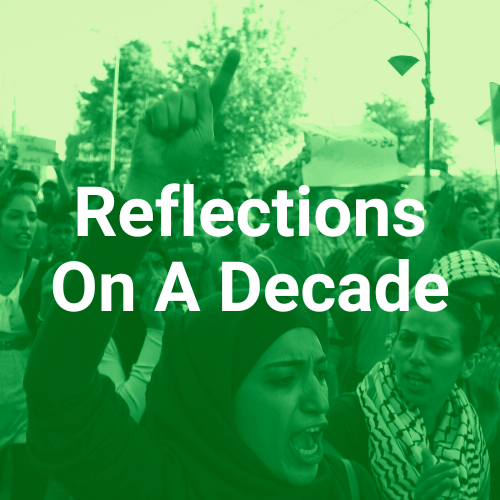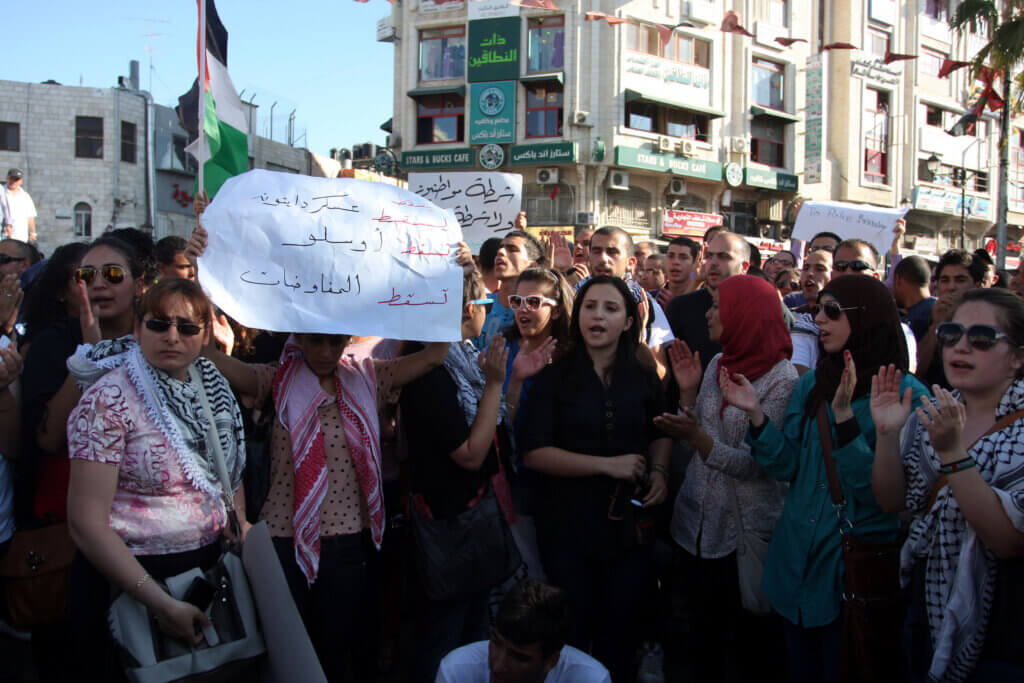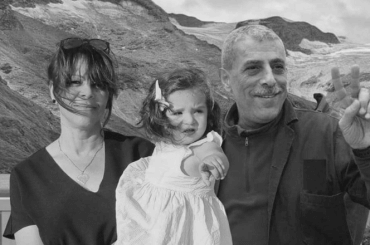
In 2011, a reversal of the typical roles in the Arab world took place, almost a U-turn of sorts. For the very first time in decades the news cycle did not center on Palestine. Instead, the Arab world became the object of our own gaze, one which turned outward rather than inward. It faced the cacophony of chants, army coups, bayonets and barricades, street-battles and the power of millions erupting in laughter, fury, love, and hope.
We were immersed in bearing witness to making visible what was concealed. The potency of the Arab street was more powerful than we realized at that particular moment. Almost unconsciously, our bodies found themselves in the small, crowded, and narrow Palestinian public space. The confined streets of a city center in a city that was never meant to become a city in the first place.
I clearly remember how in one of the very first demonstrations, after making it into Al-Manarah square, the crowd stood silent. I considered the silence to be a signifier of the distance in our own conception of what we want and who we are — a questioning of how to transform the movement of our bodies into a political act, a series of political communiques, and a series of political slogans for a confused and disoriented generation still searching for its own imprint.
The scene on that very day in Al-Manarah was uncanny — thousands of Palestinians flocking to consume, to accumulate what the market has to offer (the novel, the new, and the fresh), to engage in the act of signaling their newfound wealth through an exuberant flourishing of new spaces and hierarchies of consumption. One French writer commented that this was the “Mirage/illusion of Ramallah.” Others called our little enclave the Palestinian “Green Zone.” We stood in the shadow of the crowd of consumers, bureaucrats, laborers, merchants, chanting for the fall of the regime.
Children of a revolution that never was
Torn between the desires that we never truly recognized, desires that lie deep beyond the veil of consciousness, desires deeply woven into the fabric of our collective becoming, we immersed ourselves in questions of Realpolitik. We never managed to create the conditions for a revolution. We persisted in the liminal zone, in the noises of absolute chants, of cries and farewells, of a new rhythm that interpolated itself in the fabric of an ailing social body. Our moment was and is a phenomenon of history that will perhaps remain a petty footnote, but still a phenomenon of history that attempted to make history.
As we slowly fizzled, we took pleasure in our failures and disillusionments, and in the pleasure of thinking ourselves mature. The enemies beyond grew more insecure, more fearful of the ghosts of revolt capable of forming new lines and ways to burst open, to transgress the limits, to threaten the potency of a power that thinks itself insecure.
The eruption of revolts intensified in 2014, 2015, 2017, 2019, and finally in 2021 and 2022, as Palestine rose up once again in a month-long intifada that stood testament to an intensified courage that is still very much alive and well, that the spiritual quest to liberate our bodies from the prison of living in a time not of our own choosing simply persists.
But in spite of all that happened to us in the last decade, it would have been worse had it not happened. I choose to believe that despite all that has passed, and all that remains impassable, the relics of an obscure “we” endures. There is at least a “we” that lives within me, until perhaps another “we” emerges yet again.
Participation and bearing witness
At times, I believe that what initially ignited our presence was an unwillingness to be simple observers and witnesses to the events in the Arab world. It was this sense of almost intuitive guilt, of sitting idly by, that led us to the streets. I think it was also this intuitive guilt that led us back at many junctures. They were the times fellow travelers and friends were martyred, or as bombs fell on Gaza. The times when political prisoners chose to play the harrowing game of accelerating the clock of death (hunger strikes) in order to secure a definite release date, affording themselves a return to the intimacy of a life beyond prison.
We continuously managed to find our way back to the city center, precisely when the chaos insisted that we go beyond our small bubble and demand an end to it all.
It wasn’t surprising that the first major discussions and debates revolved around the necessity to distinguish enemies from friends. We tried to construct a political map which substantiated our understanding of a world imposed on us.
Our discussions stretched and splintered — conversations on the PA, Israel, the security services, labor, funding, the bureaucrats, the patriarchy, political parties, our internal dynamics of gendered divisions, geopolitics, neoliberalism, memory, sexuality, Palestinian geographic divisions, Islam, Syria, Egypt, and literature. We discussed interpolated binaries — of violence or non-violence, apartheid or colonialism, one-state or two-states.
It was like an unending discussion that didn’t feel like our own. Perhaps we also gave too much credence to the loud noises of discourses that attempted to infiltrate our fold, to afford ourselves a chance at outlining the substance of our own deliberations.
A rising collective and the silent echoes in the streets
I remember that momentary silence in Al-Manarah. I remember it being broken by two opposing chants. The first one, tamed and perhaps lacking radicalism, demanded that Palestinian factions, namely Fatah and Hamas, unite. The echoes reverberated “the people want to end political division.” The other, stronger and perhaps more radical, borrowed from chants heard in the streets of the Arab world: “the people want the fall of the regime.”
This was, for me, the first attempt of the disparate crowd to communicate through opposing communiques to underline the direction of our desires, hopes, and political dreams.
Only years later would I learn that radical chant came from the chest of a young man, Samer, who never returned to demonstrate with us. He came from the villages that dotted the space around the city of Ramallah. Committed to the residues of an old left, he found in our demonstrations material for disdain, puns, and jokes.
Years later, I would run into Samer through common friends. It seemed that he and his friends guessed that the demonstrators were a collage of what he called “the European left,” which he contrasted with the more authentic “Rural left.” The European Left, according to Samer, is the left of jobs embroiled in the complicity and ineffectiveness of the world of NGOs.
The question that remains perhaps unanswered is why we failed to link, include, and connect? Or perhaps the question is, did we actually fail?
Initially, I tried to challenge his dichotomy by providing facts which contradict his conclusions. Yet, if I am honest, I was also fascinated by how we appeared to him. My imagination found an opening to the world beyond us and how it perceived the unknown body of noises. How mothers viewed us, or our fathers who were former detainees looked at us. I wondered how our foes labelled us, and how the world of Palestinian revolutionary tradition disdained us, and how our enemies and political competitors attempted to point at us like a child pointing at an unknown object in order to name it, to understand it and perhaps defeat it. The question that perhaps remains unanswered is why we failed to link, include, and connect? Or perhaps the question is, did we actually fail?
Lessons and falterings
Perhaps all statements that seem obvious and truthful only emerge retrospectively. That very first moment of transformation from keen and hopeful observers of an Arab revolution, to actual and active participants in our own mini-spring was enough to tell us that there will not be an Arab Spring in Palestine. At least we will not see millions of Palestinians on Al-Manarah square chanting for the downfall of the regime. We simply did not think beyond the movement of our bodies, beyond the existing present that held at that particular moment many possible futures.
Palestine was simply not ready, its mood hopeless and skeptical, having just ended one of the most intense and bloody confrontations with Israel in 2006 (the Second Intifada). Palestinians were clinging to the notion of life — of bare life, yes, but life nonetheless.
Our movement was an embryonic movement composed of a multitude of individuals and political currents that desired to attune itself with a larger historic political rupture — the appearance of a leaderless Arab revolutionary spirit. But it’s funny how a “leaderless” movement at times seemed to be leaderful, and how leaderlessness at many junctures was the product of the inability to forge lines of trust, communication, and dialogue.
And leaderless we remained, skeptical of the power of charisma, intellect, or persona, as we jockeyed to cut the head. A body without a head we remained, or perhaps a body with too many heads. Sometimes “many” just means “less.”
Leadership was turned into a toxic function rather than a necessary role — a role that could potentially prevent endless repetitions of the same movements in the same space, always in Al-Manarah, always in the same direction. Leadership as a function that could redraw tactics, foment the rethinking of relation between activist and collective, between atom and mass. Leadership as a recognized individual voice that channels the collective.
This moment with all its ebbs and flows has become a defining feature for a new generation of journalists, editors, political commentators, academics, activists, and even a few revolutionary figures. Indeed, it was the birth of a polis, a space for debate, communication, muzawada (political rhetoric used largely to defame and belittle a political opponent), and experimentation with the boundaries that separate the possible from the impossible, a space that allowed for dialogic communication, albeit less frequently than it should have.
A generation was thinking inwardly, while they were professing some of their thinking outwardly in small groups, in break-out rooms, in café’s, in conferences. They were engaged in an honest attempt to judge their place in the world, as a collage of individuals and tortured souls thrown into a world of military occupation.
The kid within us loves to invent and create new games, loves the playfulness of testing the limits of our own bodies, of our will and our sense of place in the world. In the midst of serious problems, we moved from a theory of change inspired by the burst of bodies in major squares across the Arab world, into a world of playful testing, of pushing the ceiling, of figuring which boundaries led to which consequences. We eventually came to realize that this was not the world of hide and seek.
The personal and the collective collide
With every evaluation we held after each of our noisy demonstrations, with every “day after,” we lost a slice of hope.
With every attempt to push one of the boundaries, we lost a fellow-traveler that simply got up and bid us farewell.
The directions many of this generation took is not atypical. Some choose to disengage and return to their “normal” lives. Others transformed this moment into what Freire would call “pure activism,” or activism for activism’s sake, with limited potential for radical change. Some chose to refigure the political desires they have into organized political movements, albeit limited and short-lived. Others fashioned comfy jobs in leading regional newspapers, while some turned towards cultural production as a pursuit removed from politics. Simply put, politics reminded us of our own limitations, our own powerlessness and our own deeply seated fear of freedom, of actualizing what we professed to politically desire. Most of us simply sublated that political moment with personal trajectories that we still judge to be unsatisfactory.
I can feel the paralysis that gripped us in our attempt to radically change the world around us, because change was also bloody, scary, chaotic, and demanded a price. The breaking news only served to deepen this paralysis, as we received the harrowing news early in the morning, informing us of friends who were martyred, or of friends taken into custody by a post-modern and psycho-analytically attuned military gulag.
To think about our world and our future, we could muster both the most prophetic and utopian of dreams, but also the dystopia lurking behind all our notions of the coming paradise, the Palestine yet to-come.
The list of all possible mutations arising from this moment is outstanding, a multitude of political orientations met in Ramallah in 2011 — post-Islamist, Islamist, leftist, liberals (generally unwilling to call themselves liberals), and political activists from all shades and geographic backgrounds. Critically, most of us were simply confused, even when we couldn’t confess it.
For more than a decade new movements rose and fell. New collectives, educational initiatives, websites, media operations, mobilization hubs, cooperatives, and a wide range of various rhizomatic formations. We failed to see the larger picture, the political ecology of various components interacting, communicating, competing, and rivaling each other. Despite the internecine squabbles and the infighting, we were opening the space to think and rethink political action — and in some instances, to actually act.
Ironically, the world beyond saw us as more dangerous than we reckoned of ourselves. Some were arrested, others were killed and martyred, and several were coaxed by larger political powers. Israel chose to label and name a movement that repeatedly failed to name itself, outlawing an organization that never truly was. It used its own power of naming and labeling, its own power to define, to include and exclude, to choose who to arrest and who to let live conditionally.
The naive children of that moment were slapped by a reality that simply overwhelmed us. The absence of friends, their emigration, their desire to live without the sound of chaos, became a predominant feature. Chaos, as Maurice Blanchot notes, does not figure the beauty of the void, and nor does it give meaning to the limitless abyss. Chaos instead proliferates and multiplies in relation to wild rage, without a beginning and without an end. A repetitive pulsion that begets while begetting nothing. To turn away from chaos is also to turn away from a raging repetitive pulsion, towards a world you can control, towards a new repetition that manages to make us feel secure. The best of all sensible repetitions is perhaps love; indeed, many met in chaos and fell in love and in their mutual act of falling birthed a new generation of voices that might make it to Al-Manarah soon enough. Our calendars were now full of weddings instead of demonstrations, and for a time we celebrated together.
Losing hope, offering hope
At some point we lost the ability to transgress, to intervene and change reality. And with the lack of hope, love, dialogue, and empathy, the multitude chose new causes, both cultural and sectarian. Yes, there is the sect that does not like sects among us, a tribe that abhors tribalism, but we became spokespeople of new socio-cultural configurations, causes that demand from us more distance, more pain, more heroics in the face of each other.
As Paulo Friere points out, sectarianism castrates, it mythicizes, and it turns reality into a false reality, one that is unchanging. It feeds a hopeless discourse of cynical victimization, and increases the distance among friends, who slowly turn into enemies, into the mythical political opposite, into the antipodal other. In this instance, Israel simply becomes the mythic enemy beyond, while the friend, the close-other, becomes the enemy epitomized, the devil embodied. We turned into our own best enemies having failed to confront the enemies lurking beyond.
We became harsher, tougher, and even more distrustful. We became hysteric and paranoid, and we even started to see informants everywhere. But critically we disremembered what we actually managed to change within ourselves and in the world beyond our narcissistic small differences.
In a time where no one said “no” to the rising authoritarianism of the PA, we were among the first to say no. We thought Palestine, we wrote Palestine, we even refashioned humility as we understood some of our personal limitations. We tested our resolve, our courage, our political commitment, and some chose radicalization rather than sectarianism, communication with a wider society instead of foreclosure among small cliques. Indeed, we also helped script the discourse of the current political struggle. We mobilized for prisoners, against corruption, against cooperation with Israel, against a world that sadistically boasts of our death right in our animated and lively faces.
We met friends like Bassel Al-Araj and Nizar Banat, we helped re-energize Palestinian academia, and even played role in the regeneration of political factions that stood idle for years. We problematized normalization, we forged a space to rethink the issue of Palestinian engagement in the Israeli Knesset and we shouted and screamed in anger, in guilt, in desire, in hope.
Perhaps we were only the screams of a dying Palestinian collective consciousness, and perhaps we required a cleansing of sorts as our lives were slowly but assuredly embroiled in the alienated comfort and struggle of a world Ghasssan Kanfani saw fit to call “a world not ours.”



“it was the birth of a polis, a space for debate, communication…. and experimentation with the boundaries that separate the possible from the impossible, a space that allowed for dialogic communication, albeit less frequently than it should have….. ….We failed to see the larger picture.”
__________________________________________________________________________
Special to read this reflection of cultural dynamics. A much needed examination toward coming out ahead in the long run.
Great lead photo of women activists taking initiative on the front line.